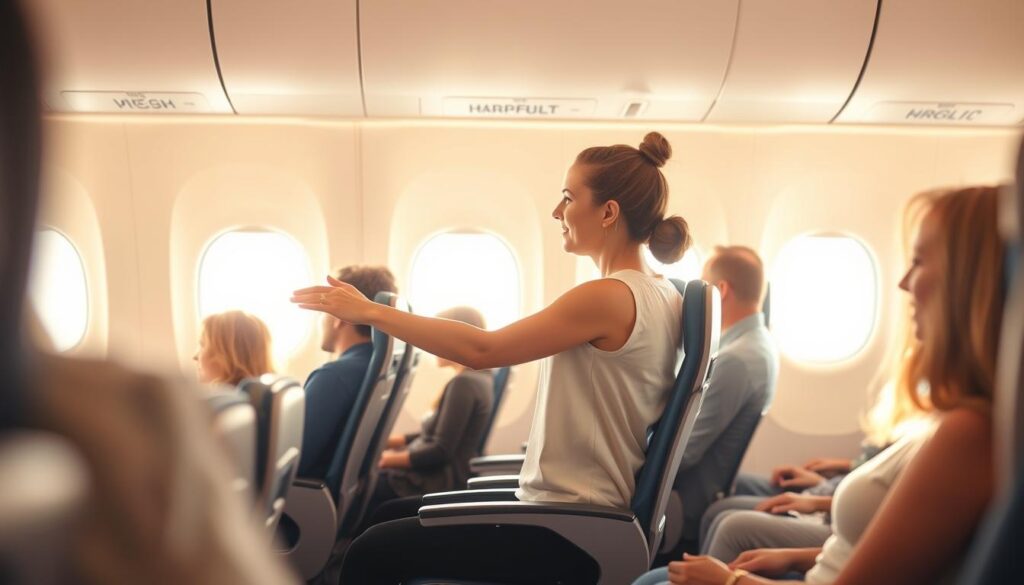“As an Amazon Associate I earn from qualifying purchases.” .
As I stepped off the plane, I felt a wave of exhaustion. The time change had messed with my body, making me feel off and unfocused. I had heard about jet lag, but experiencing it was a whole different story. I knew I had to find a way to beat it.
Jet lag is a big problem for travelers who cross time zones. It messes with our natural sleep cycle, causing tiredness, stomach issues, and brain fog. But, there are ways to lessen these effects and adjust to new time zones quickly. This lets you enjoy your travels more.
In this guide, we’ll explore the science of our body’s natural rhythms. We’ll look at effective ways to manage jet lag before, during, and after your trip. You’ll learn how to quickly adjust your body clock. Say goodbye to feeling tired and hello to better travel experiences.
Key Takeaways
- Circadian rhythms control our sleep-wake cycle, hormone release, body temperature, and hunger levels.
- Jet lag is caused by the disruption of circadian rhythms due to rapid time zone changes.
- Symptoms of jet lag include sleep disturbance, fatigue, digestive issues, and cognitive impairment.
- Gradually adjusting sleep schedules, strategic light exposure, and careful dietary choices can help reset the body clock.
- Supplements like melatonin and relaxation techniques can also aid in combating jet lag.
Understanding Jet Lag and Its Effects
Jet lag happens when your body’s clock, or circadian rhythm, gets out of sync with the new time zone. This can cause sleep problems, tiredness during the day, stomach issues, and trouble focusing. It’s a common issue for travelers.
What Is Jet Lag?
Jet lag is a temporary sleep disorder that happens when you travel across time zones. Your body can’t quickly adjust to the new time, causing a mismatch between your natural rhythms and the local time.
Common Symptoms of Jet Lag
- Difficulty falling asleep or staying asleep
- Daytime fatigue and sleepiness
- Gastrointestinal problems, such as constipation or diarrhea
- Reduced mental clarity and cognitive performance
- Headaches and irritability
Duration and Severity
The severity and how long jet lag lasts can vary. It depends on how many time zones you cross, the direction you travel, and your age and sleep habits. Symptoms usually start within a day or two after traveling and can last from a few days to weeks. It takes about a day to recover for each time zone crossed.
| Factors Influencing Jet Lag | Impact |
|---|---|
| Number of Time Zones Crossed | The more time zones crossed, the more severe the jet lag |
| Direction of Travel | Eastward travel often causes more severe jet lag than westward travel |
| Age | Older adults may need more time to recover from jet lag compared to younger individuals |
| Frequent Flyer Status | Frequent travelers may be more susceptible to the effects of jet lag |
Jet lag can lead to serious issues, like an increased risk of auto accidents due to drowsy driving. Knowing what causes and affects jet lag is key to finding ways to manage it.
The Science Behind Circadian Rhythms
Our bodies have a natural 24-hour cycle called the circadian rhythm. It controls things like hormone release, body temperature, and when we sleep and wake up. Knowing how this works helps us deal with jet lag and adjust our body clock.
How Sleep Patterns Work
The circadian system is run by a “master clock” in the brain. It’s in the suprachiasmatic nucleus (SCN) of the hypothalamus. This clock helps our body’s daily rhythms.
When it gets dark, the SCN tells our body to make melatonin. This hormone makes us sleepy. But when we see light, melatonin levels go down. This tells our body to wake up.
Impact of Light on Your Body Clock
Light is key to our circadian rhythms. Dark makes us sleepy by increasing melatonin. But light in the day keeps us awake by lowering melatonin.
By understanding how light affects us, we can adjust our body clocks. This helps us fight jet lag better.
“Circadian rhythms are physical, mental, and behavioral changes that follow a roughly 24-hour cycle, responding mainly to light and darkness in our environment.”
| Metric | Value |
|---|---|
| Polysomnographic data show that jet lag results in changes in sleep-wake timing and various aspects of sleep architecture. | True |
| Circadian misalignment due to jet lag can lead to a cluster of symptoms including major metabolic, cardiovascular, psychiatric, and neurological impairments. | True |
| Treatment options for jet lag, such as bright light exposure, melatonin, and hypnotics, vary in efficacy based on the time of use, the length of time in the new time zone, and the specific circadian disturbance involved. | True |
Pre-Travel Preparation: Get Ready for Change
Getting ready for jet lag before you leave can really help. By slowly changing your sleep schedule to fit your destination, you can reduce jet lag’s impact. This makes the transition smoother.
Adjusting Your Schedule Before Departure
Start changing your sleep and wake times a few days before flying. If you’re going east, sleep and wake up earlier. For westward trips, go to bed and wake up later. This helps your body adjust better to the new time zone.
The Role of Sleep Hygiene
Good sleep habits are key before you travel. Keep a regular bedtime routine, avoid screens and bright lights at night, and make your sleep area comfy. Quality sleep before your trip helps manage jet lag when you arrive.
| Tip | Description |
|---|---|
| Adjust sleep schedule | Gradually shift your sleep and wake times to match the time zone of your destination. |
| Establish good sleep hygiene | Maintain a consistent bedtime routine, avoid screens before bed, and create a comfortable sleep environment. |
| Utilize natural cues | Exposure to daylight and taking melatonin can help your body adapt to the new time zone. |

“Preparing by gradually shifting the circadian rhythm in the days leading up to the flight can help adjust to the destination time zone.”
Diet and Hydration: Fueling Your Journey
Proper nutrition and hydration are key to managing jet lag. By planning your meals and staying hydrated, you can ease your body’s adjustment to new time zones. This helps reduce the impact of long-distance travel.
Foods to Eat Before and During Travel
Before and during your flight, eat foods that help regulate your sleep and give you energy. Choose protein-rich options like white-meat poultry, beans, pork tenderloin, and lean beef for better sleep. Add complex carbohydrates, like whole grains, to keep your energy up.
Importance of Staying Hydrated
Dehydration can make jet lag symptoms worse, causing fatigue, headaches, and feeling less alert. Drink plenty of water before, during, and after your flight to fight dehydration. Avoid caffeinated and alcoholic drinks, as they can also dehydrate you and mess with your sleep.
| Nutrition Tips for Jet Lag | Hydration Tips for Jet Lag |
|---|---|
|
|
By focusing on travel nutrition and staying hydrated, you can help your body adjust better to jet lag. This makes your journey more refreshing and enjoyable.
Strategies for Managing Jet Lag During Travel
Jet lag on long flights can be tough, but there are ways to lessen its impact. Smart timing, in-flight movement, and habits can help you feel refreshed at your destination. This way, you’re ready to enjoy your day right away.
Smart Travel Tips
Timing your sleep on flights to match the destination’s night can help a lot. Stay away from alcohol and caffeine, drink water, and set your watch and devices to the new time zone. These small steps can greatly reduce jet lag when you arrive.
The Benefits of In-Flight Exercises
Doing light exercises on the plane can boost circulation and fight off tiredness. In-flight sleep and travel comfort improve when you stretch, do yoga, or walk around. Being active keeps you energized and ready for your day at the destination.
| Jet Lag Mitigation Strategies | Benefits |
|---|---|
| Timing sleep on long flights | Aligns with destination’s nighttime, reducing jet lag impact |
| Avoiding alcohol and caffeine | Maintains hydration and mental alertness during travel |
| Adjusting watch and device times | Mentally prepares for the time change at the destination |
| In-flight exercises and movement | Improves circulation and reduces fatigue, enhances in-flight sleep and travel comfort |

Using these strategies on your travels can greatly reduce jet lag. You’ll arrive feeling refreshed and ready to enjoy your trip fully.
Post-Travel Recovery: Resetting Your Body Clock
Arriving at your destination is just the first step in your journey. Overcoming jet lag and resetting your body clock is key for a great post-travel experience. By using the right strategies, you can quickly adjust to the local time zone.
Getting Back on Track with Sleep
One of the main ways to fight jet lag is to focus on sleep. When you arrive, get some morning sunlight. This helps your body clock adjust. Try to avoid long naps and stick to the local schedule.
If you need a nap, keep it short. For afternoon arrivals, nap for 30 minutes. For early morning flights, nap for up to 90 minutes. Staying active during the day also helps you sleep better at night. Following the local schedule, even if it’s hard, helps your body adjust faster.
Power Naps: When and How
- For afternoon arrivals, limit naps to 30 minutes
- For early morning flights, nap for up to 90 minutes
- Avoid long, irregular naps which can disrupt your sleep-wake cycle
- Time your naps to coincide with the local afternoon lull for maximum effectiveness
By balancing sleep, light, and activity, you can speed up your body’s adjustment to the new time zone. This reduces the effects of sleep adjustment and jet lag recovery.
Using Light Exposure to Your Advantage
Jet lag is a big problem for travelers who cross time zones. It messes with the brain’s clock cells, causing brain fog and insomnia. But, using light wisely can help reset your body’s clock and reduce jet lag.
Morning vs. Evening Light
Morning sunlight helps shift your body clock earlier, making it easier to adjust to new time zones. Evening light is good for staying up later. By adjusting your light exposure by one hour each day, you can reset your body’s clock.
Tools to Enhance Light Exposure
- In areas with little natural light, light therapy lamps with 10,000 lux can fight jet lag.
- Apps can help plan your light exposure to adjust to different time zones.
- Portable light therapy devices, as light as 51g (1.83 oz), are great for travelers.
Strategic light exposure can help your body adjust to new time zones faster and reduce jet lag. Start adjusting your body’s rhythm before you travel to make the transition smoother.
“Light exposure plays a key role in beating jet lag. Adjusting your body’s rhythm by one hour each day with light helps.”
Supplements and Medications: Do They Help?
Many travelers use supplements and medications to fight jet lag. Melatonin is a top choice. It helps control our sleep-wake cycle.
Melatonin: A Popular Choice
Melatonin supplements can lessen jet lag’s effects. They work best when taken near bedtime in the new zone. Studies show a 5mg dose can help you sleep faster and better.
For those crossing five or more time zones, or 2-4, melatonin is a good option. The best dose is between 0.5 and 5mg. Higher doses don’t offer much more benefit.
Over-the-Counter Options
- Travelers might also try other sleep aids or natural remedies for jet lag.
- A 2019 study found magnesium, melatonin, and vitamin B complex can help with insomnia.
- Vitamins B, C, D, and E can also improve sleep and reduce fatigue, aiding in jet lag recovery.
Always talk to a healthcare provider before trying supplements or medications. This is true for those with health issues or on other meds. The right dose and timing are key to their effectiveness.
“Nine out of ten trials found that melatonin, taken close to the target bedtime at the destination (10pm to midnight), decreased jet-lag from flights crossing five or more time zones.”
| Supplement | Potential Benefits for Jet Lag | Recommended Dosage |
|---|---|---|
| Melatonin | Helps regulate sleep-wake cycle | 0.5-5mg before bedtime in new time zone |
| Magnesium-Melatonin-Vitamin B Complex | May improve sleep and reduce insomnia | Follow product instructions |
| Vitamin B | May alleviate fatigue | Varies by vitamin B type |
| Vitamin C, D, E | May support sleep and reduce fatigue | 70-150mg (C), 15μg (D), 15mg (E) |
Mindfulness and Relaxation Techniques
Traveling can be stressful, both mentally and physically. Mindfulness and relaxation techniques can help manage travel stress and jet lag. These practices can make you feel more centered and focused during your journey.
Breathing Exercises
Deep breathing exercises are great for relaxation and better sleep. When you’re tense or anxious, focus on your breath. Inhale deeply, hold for a few seconds, and then exhale slowly. Do this a few times to calm your mind and body.
Stress Reduction Strategies
Meditation and progressive muscle relaxation can reduce travel stress and anxiety. Before your flight or during layovers, find a quiet spot for 15-20 minutes of mindfulness meditation. This helps manage jet lag and adjust to new time zones. Progressive muscle relaxation, tensing and releasing muscles, prepares your body for rest.
Adding mindfulness and relaxation techniques to your travel routine can change your experience. By caring for your mental and physical health, you can handle travel’s ups and downs better. You’ll enjoy your destination more fully.
“Meditation is not about becoming a different person, a new person, or even a better person. It’s about training in awareness and getting a healthy sense of perspective. You’re not trying to improve or change yourself, you’re simply trying to wake up and become more aware.” – Jon Kabat-Zinn
The Role of Technology in Combating Jet Lag
Travelers on long-haul flights often face jet lag. Luckily, technology offers help. Sleep tracking apps and special lighting are changing how we deal with jet lag.
Sleep Apps and Tools
Jet lag apps, like the Jet Lag App, are key for frequent flyers. It helps users avoid severe jet lag. Some even say they don’t feel jet lag when crossing time zones.
Apps like TimeShifter, made by a Harvard doctor, give personalized plans. They consider your sleep and travel plans. This helps your body adjust to the new time zone smoothly.
Using Blue Light Blocking
Blue light from screens can mess with our sleep. Apps and glasses that block blue light help keep melatonin levels up. This way, travelers can adjust to the new time zone better.
Airlines are also using special lighting to fight jet lag. Qantas worked with researchers on a lighting system for their long flights. It helps passengers adjust to the local time before landing.
Thanks to jet lag apps and sleep technology, travelers have better tools to fight jet lag. This makes traveling easier and more enjoyable.
Long-Term Tips for Frequent Travelers
For those who often cross time zones, setting up regular routines can greatly help. Keeping a steady sleep schedule at home and quickly adjusting to new time zones when traveling is key. By creating personal plans for sleep, light, and meals, travelers can make their journeys smoother.
Consistency Is Key
Frequent travelers understand that staying consistent is vital. Keeping a regular sleep schedule and bedtime routine at home helps your body adjust to new time zones. This also applies to your eating, exercise, and light exposure, all important for your body’s internal clock.
Developing Adaptation Techniques
With time, travelers can craft their own ways to adjust to new time zones. This might include using yoga and exercise at the right times, taking melatonin, and controlling light exposure. By listening to their body’s needs, travelers can find a routine that makes their trips easier.
FAQ
What is jet lag, and how does it affect the body?
What are the common symptoms of jet lag?
How can I prepare for jet lag before my trip?
What role does diet and hydration play in managing jet lag?
What strategies can I use to manage jet lag during travel?
How can I reset my body clock upon arrival?
How can I use light exposure to manage jet lag?
Are there any supplements or medications that can help with jet lag?
How can mindfulness and relaxation techniques help with jet lag?
How can technology be both helpful and harmful in managing jet lag?
What tips can you provide for frequent travelers to minimize the impact of jet lag?
“As an Amazon Associate I earn from qualifying purchases.” .



